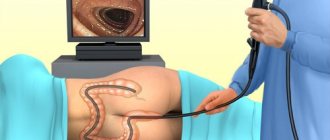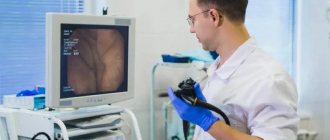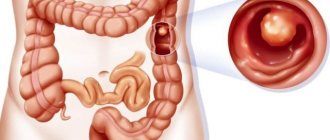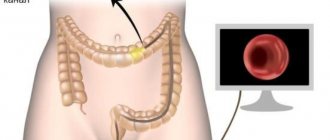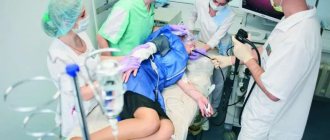directions
Fibercolonoscopy of the intestine (FCS) is an effective, accurate and modern method of endoscopic examination of the rectum and colon using a device - a fibercolonoscope.
Such an examination allows the endoscopist to carefully examine and evaluate the condition of all parts of the intestine from the inside, its mucous membrane and diagnose the disease at an early stage. Such timely detection of the disease helps to avoid severe complications and the transition of the disease to a chronic and acute form, and also speeds up the treatment process itself.
Stock
Promotion "FGDS (gastroscopy)"
FGDS with comfort at an attractive price
2000 a until 30.09.2021
Promotion “FKS (Video colonoscopy)”
Early diagnosis of gastrointestinal tumors
2500 a until 30.09.2021
Currently, work is underway on the website to change the price list; for current information, please call: 640-55-25 or leave a request, and an operator will contact you.
Preparation for colonoscopy using the drug "Fortrans"
A packet of Fortrans is diluted in 1 liter of water (clear juice or weak tea can be used). The more acidic the liquid, the easier it will be to drink the solution.
You should start drinking the solution on the day before the colonoscopy, no earlier than two hours after lunch. Lunch should be light (broth, tea). The Fortrans package contains 4 sachets. It is advisable to use all four (for persons whose weight is more than 50 kg). You need to drink a glass of the solution every 15-20 minutes for 4-5 hours. The optimal time to take Fortrans is from 9 a.m. to 11 p.m. You can wash down the solution with a small amount of sour juice (without pulp) or eat it with a slice of lemon. Loose stools will appear 1-2 hours after starting to take the drug, and 2-3 hours after taking the last dose, the intestines will be completely cleansed.
After which you cannot eat anything until the colonoscopy.
Our clinics in St. Petersburg
Structural subdivision of Polikarpov Alley Polikarpov 6k2 Primorsky district
- Pionerskaya
- Specific
- Commandant's
Structural subdivision of Zhukov Marshal Zhukov Ave. 28k2 Kirovsky district
- Avtovo
- Avenue of Veterans
- Leninsky Prospekt
Structural subdivision Devyatkino Okhtinskaya alley 18 Vsevolozhsk district
- Devyatkino
- Civil Prospect
- Academic
For detailed information and to make an appointment, you can call +7 (812) 640-55-25
Make an appointment
You can undergo the FCS procedure at a multidisciplinary medical center in St. Petersburg by making an appointment with our gastroenterologist, who will refer you for examination. Qualified specialists and modern equipment at the Medicenter help diagnose and treat diseases in the field of gastroenterology of varying severity.
Medpomosch 24 specialists are always ready to help you!
Medpomoshch 24 is a multidisciplinary medical and clinical diagnostic center. With us you can undergo diagnostics and treatment in 65 areas without queues or fuss. And all this in one building. Clinical diagnostic specialists have all the necessary equipment to effectively and safely perform FCS. The procedure in our clinic is completely safe and occurs without complications. The price of intestinal FCS in St. Petersburg in “Medpomosch 24” is only 3,500 rubles. Call right now and make an appointment at a time convenient for you!
Intestinal FCS procedure
The examination of the intestines is carried out using a fiber colonoscope, which is a thin flexible tube with a backlight and an eyepiece that displays an image on a monitor. In addition, the device is equipped with special tools for various medical procedures and air supply. During the study, the doctor can remove polyps, stop bleeding, or take a piece of tissue from the organ being examined for a biopsy to diagnose various diseases.
FCS of the intestines is performed while lying on the left side with the knees pulled up. During the procedure, the patient may be asked to roll over onto their back and bend their knees. The examination begins with palpation of the rectum. Then the fiber colonoscope is carefully inserted through the anus and gradually moves forward while supplying air, which helps to straighten the lumens of the empty intestine. At the end of the procedure, air from the intestine is sucked out using a fiber colonoscope, which is then slowly removed from the patient’s anus.
As a rule, intestinal FCS is performed under local anesthesia, which smoothes out unpleasant and moderately painful sensations. In some cases, FCS can be performed under general short-term anesthesia if the patient has inflammatory diseases of the rectum. The study takes from 15 to 30 minutes, depending on the anatomical characteristics of the person, the disease and the condition of the intestines.
FCS is safe and generally well tolerated with local anesthesia and sedation. But in some cases, the examination is contraindicated or is carried out only for health reasons.
Colonoscopy in a dream
For patients who want to completely eliminate discomfort during colonoscopy, the option of performing the study in a state of medicated sleep is offered.
Colonoscopy in a dream is carried out in the hospitals of JSC "Family Doctor". To put you to sleep, the drug “Proviv” is used. Drug-induced sleep should be distinguished from general anesthesia. Before the drug is administered, you must be examined by an anesthesiologist, so you must come to the study in advance - 30 minutes before the time for which the colonoscopy is scheduled. In this case, you must have a transcript of a fresh electrocardiogram on hand.
The patient falls asleep as soon as the administration of the drug begins, and wakes up almost as soon as the administration ends. Full recovery occurs in 15-20 minutes, but it is recommended to stay in the hospital for 1-3 hours under medical supervision. It is recommended to drive no earlier than 2 hours after the procedure.
After the FCC
After the study, the patient can return to their normal diet, but it is still advisable to avoid spicy, fried foods on the first day after FCS. In case of minor abdominal pain, the doctor may prescribe antispasmodics. Sometimes after FCS, a feeling of fullness of the abdomen with gases may persist for some time. With such symptoms, activated charcoal helps well, as does bed rest while lying on your stomach.
If the patient had a polyp removed or a biopsy performed during FCS, slight bleeding may occur on the first and subsequent days. If the bleeding increases or does not go away within several days, you should definitely consult a doctor!
How to prepare for a colonoscopy?
Colonoscopy will be effective only if the patient has taken a responsible approach to preparing for the study and followed all the necessary recommendations.
First of all, 3 days before the procedure you should switch to a slag-free diet. The following should be excluded: brown bread, cereals, fresh vegetables and fruits, greens, cabbage in any form, legumes, peas, lentils, dried fruits, including raisins, berries and nuts, fatty dairy products (including cream, sour cream, ice cream , fatty cottage cheese), fatty fish and meats (including duck and goose), pickles, marinades, smoked foods, sweets, alcohol, carbonated drinks, kvass.
Allowed to eat: rice, pasta made from premium flour, white bread, boiled lean meat (veal, beef, chicken), cutlets, meatballs or soufflé, eggs, lean fish (cod, pike perch, perch, pike) , vegetable decoctions, potatoes (without peel), low-fat dairy products (cottage cheese, cheese, kefir, skim milk), honey.
If you suffer from constipation, be sure to take laxatives daily, perhaps slightly increasing their dose compared to the usual one (without violating the instructions for use).
On the eve of a colonoscopy, it is necessary to cleanse the intestines. Doctors at Family Doctor recommend using Fortrans or Fleet phospho-soda for this purpose. Taking medications will save you from having to do an enema.
Main indications for the procedure
Routine fibrocolonoscopy is recommended to be performed at least once every five years. The World Health Organization recommends it for all people over 40 years of age. This preventive measure will allow for the timely detection of a number of dangerous diseases that have minimal clinical symptoms in the initial stages. Urgent indications for this study include:
- severe pain in the large intestine;
- mucous or purulent discharge from the rectum;
- persistent stool disorders of unknown etiology;
- long-term anemia;
- sudden weight loss of the patient;
- suspicion of the development of colon tumors.
Colonoscopy: why, when and what to expect?
Colonoscopy
is a test that allows your doctor to examine your colon.
To perform a colonoscopy, a flexible thin instrument called an endoscope
.
It has a built-in miniature camera and light source that allows you to examine the inner surface of the intestine in detail. The structure of the endoscope also provides instrument channels, which, if necessary, allow the use of various instruments during the examination. Such instruments can be used to obtain biopsies
and
remove polyps
.
Colonoscopy
is the best way to diagnose and prevent
colorectal cancer
. This test is also very useful for diagnosing and treating other colon diseases, such as inflammatory bowel disease and chronic diarrhea.
Complications during colonoscopy are extremely rare. When polyps are removed, bleeding may occur, but this does not happen more often than in 1-6% of cases.
Currently, colonoscopy is the only available research method in which it is possible to diagnose
and
remove
even the smallest polyps.
This video will help answer the most frequently asked questions that patients have if they have never had a colonoscopy before.
The importance of bowel preparation
To perform a detailed examination, the intestine must be clean,
Therefore, the key point of the entire study is proper
preparation before the examination.
Your doctor will provide you with information about the medication you need to prepare for your colonoscopy. This may be in the form of a powder for dissolution in water. Strict adherence to the instructions for taking the drug will ensure complete cleansing of the intestines.
Poor preparation may be the reason why polyps or cancer will not be detected during a colonoscopy!
If the doctor is unable to adequately view all parts of the colon, the procedure may need to be repeated.
After finishing taking the drug to prepare for a colonoscopy, the fluid coming out of the intestines should be clear and clean like water. It is believed that some bowel preparation solutions have an unpleasant taste, but preparations have now been created with significantly improved taste qualities, such as citrus flavors. In addition, these drugs do not need to be consumed in very large quantities, as was the case before.
Rest assured: your doctor will select the most suitable drug and preparation regimen for you. During your first visit to your doctor, you will be given recommendations on the bowel preparation medication you need, in addition to information about the test itself. You will need:
- drink a certain amount of liquid at a certain time;
- strictly adhered to a special diet: nothing to drink or eat two hours before the examination.
If you still have any questions about your medication regimen, be sure to discuss them with your doctor during your initial consultation.
In addition to taking a bowel preparation medication, you will need to strictly follow a special diet two to three days before the test.
This will help achieve complete
cleansing of all parts of the colon
.
Before meeting with your doctor, it will be very helpful to prepare a complete list of medications with dosages that you usually take. It is important to understand that your standard medication regimen can only be changed under the guidance of your healthcare provider, who can evaluate your specific situation and update your medication plan accordingly.
Please do not make any decisions in this regard on your own.
